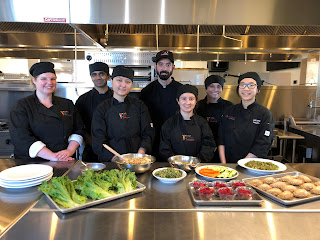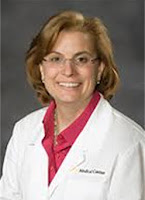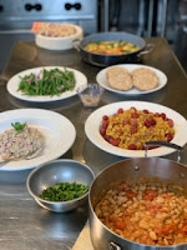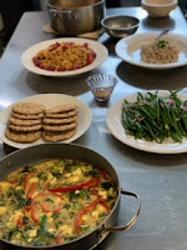Culinary Medicine at The Kitchens
You are what you eat.

This healthcare vision is coming into focus through an innovative collaboration between VCU's Culinary Medicine program and The Kitchens at Reynolds.
At the heart of the program is Assistant Professor at VCU Stony Point Women's Health, Dr. Deborah Koehn.

"However, just knowing about nutrition is not the same thing as learning to talk about food with your patients," Koehn continues, "so the goal from the beginning was to develop an interdisciplinary program where we have the three components of good health at the table: the physician, the dietician, and the chef. The physician may understand the chronic disease, but the dietician can help more with the counseling techniques and behavior modifications as well as guide the nutrition goals, and the chef can help to make the food delicious."
The partnership is a perfect match for both VCU and Reynolds. During the four week class, Tuesdays are "Journal Club" where students review literature related to the topic of the week; Thursdays are for shopping where the students visit a different grocery store each week and discuss pricing, food content, and options. Fridays, when Reynolds culinary students are away from The Kitchens, the VCU students take over the ovens, the stove tops, and the counters, and learn about food preparation.

"I'm delighted to have been chosen to assist with the class," says Reynolds Culinary Arts student and Culinary Medicine intern, Anya Glessman. The program is also a perfect match for her: "I'm learning about culinary nutrition and assisting with a topic of my interest." Chef Jesse Miller was aware that she wanted to pursue a career in this field, so when conversations began about bringing the Culinary Medicine program to The Kitchens, he reached out to her with the opportunity to assist.

New sessions of the program are coming to The Kitchens this spring, and Chef Leek and Anya Glessman will again be there to assist Dr. Koehn and her students as they work toward changing health one life at a time.
Watch this short video taken during a class session.
The first mention of the phrase "you are what you eat" came from the 1826 work Physiologie du Gout, ou Medetations de Gastronomie Transcendante, in which French author Anthelme Brillat-Savarin wrote: "Tell me what you eat and I will tell you what you are."